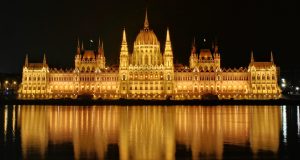Posters on the walls show a portrait of a Native American, an African American blues musician, a Texan cowboy, a baseball game, and Barack Obama. There are English books and magazines on the shelves and lots of flyers and brochures on the tables. The American Corner Budapest is committed to providing information on American culture to the general public. The Corner educates as well as entertains. It introduces us to the presidential elections, to contemporary African American literature, and, if need be, the recipe for Thanksgiving pumpkin pie. We have interviewed Erika Sólyom, director of the American Corner Budapest.
What is the American Corner actually?
The American Corner (AC) program is a U.S. State Department initiative which was established around 10-15 years ago. It’s a cultural mission whose aim is to ensure that local communities and audiences in various countries have access to objective, impartial, multifaceted information about the United States and its culture. Many people ask me what exactly this means.
The majority of our programs are centered around American culture, U.S. life, sports, literature, geography, ethnic groups, arts, education, politics, history, and so on. We would like to present a very broad picture of what the United States really is, and the mosaics it is made up of. People usually think that a lot of Americans come to the Corner but this is only partially true, as our audience is largely Hungarian. However, most of our presenters are Americans and 95 percent of our programs are in English. One of our goals is to promote the English language.
The American Corners initiative is not a specifically Hungarian program as there are around 400 similar Corners in 60 countries worldwide. There are five Corners located in Hungary: the first one opened its doors in Pécs but there are Corners in Veszprém, Eger, Debrecen, and the newest one is in Budapest. The Budapest Corner was established as a co-operation between the U.S. Embassy and Corvinus University of Budapest.
Why was Budapest the last one to open a Corner?
The main goal of the initiative is to provide information for the local audience. The first Corners are typically opened in smaller towns, far from the capital, since people in the capital can have easier access to English native speakers. Of course, this has changed considerably in the age of the Internet but this was the original concept at the creation of the first Corners.
Who visits the Corner?
In the first year our main task was to reach people outside of the university. In the beginning, mostly university students came but a few months passed and our audience became bigger and broader. Thanks to the media and university students we were able get to more and more people. Because of this our audience is really mixed; we have visitors from age 4 to 84.
What are the most popular services?
The Corner has two main functions: it is both an information/resource and also a programming center. By information center I mean that we have a small library where visitors can also find great magazines, newspapers. Our main profile, however, is organizing programs. We have 50-60 events annually. Therefore, visitors either come to check out library items or to participate in a particular program but many people stop by to inquire about scholarships as well. Although we are not a Certified Advising Center – there are some among the Corners who are – we still try to help those who are interested in studying in the United States. There are a number of Advising Centers in Budapest, for example the EducationUSA, which is located at the office of the Fulbright Commission.
Can you categorize your events?
It is worth taking a look at our website as there is a detailed overview of our programs. We differentiate between three types of programs. One of them is called Special Events. These programs are one-time, single events such as workshops, exhibitions, talks, presentations, etc. For example, the visit of Michael Dukakis – Governor of Massachusetts – last year, was one of these events. We also run Regular Programs. For example, TALC (Tuesday American Language Club) is an English conversation club held on the first Tuesday of every month. TALCs are always connected to an American calendar event of the given month. For example, the programs in February are centered around African American history, in April around Earth Day, in May around World Press Freedom Day, and in July around Independence Day. Finally, within regular events, there is the Kids Corner which is targeted towards children, and elementary school students. We also organize film screenings called Movie Nights. I would also like to mention our High School Outreach series for high school students. During those events we either organize programs in high schools on-site or the high school students come and visit us here at the Corner. Our next outreach will take place at a school in the 9th district where we co-organize an American Day event and run a trivia competition about the United States.
The presidential elections took place in November. Did you organize any special events?
Yes, indeed. In the past six months we had an Event Series related to the presidential elections. For example, the Citizen Voter Registration took place at the Corner. This meant that the American Democrats Abroad volunteered to help Americans living in Hungary with the voter registration and also provided Hungarians with information about the voting process.
So basically Americans living in Hungary could come to the Corner and register to vote at the elections?
Yes. During these types of events many Americans living here also visit the Corner. During the presidential elections we organized four programs. There was a highly intriguing presentation by the Chief Consul from the U.S. Embassy the day after the elections. She is from Alaska and shared many interesting stories. We had a High School Outreach Program as well where a U.S. election specialist came to give a presentation at a local high-school in Budapest. Our third event was a presentation by a former Fulbright professor from San Francisco who touched upon various topics related to the elections. We have an exceptionally good relationship with Fulbright scholars who come to Hungary on teaching or research grants. Our fourth event in our Election Series was a Movie Night, when we screened a documentary about Hillary Clinton.
Apart from Special Events and Regular Programs what else does the Budapest Corner offer?
We have another type of program called the Event Series. Every academic year there are a couple topics that a number of programs are centered around. We’ve had program series connected to presidents, alumni, tolerance and entrepreneurship. In the series called Bicultural Bridges we presented Americans who have Hungarian connections. For example, we had an American medical researcher, a Hungarian-American documentary filmamker, a painter, and so on. The topic of tolerance is present every year in our programs since strengthening open-mindedness, tolerance and dialogue between cultures are all among the Corner’s missions.
Hungarians who visit the Corner are probably rather open towards other cultures but they still might have some stereotypes. Am I right?
When I was interviewed for this job, the interviewers asked me how I would explain American culture if someone comes to the Corner and says that ”There is no such thing as American culture and there are only hamburger eating cowboys…” Fortunately, I have not experienced this attitude at the Corner because those who come here already know a bit about the United States. However, I witness prejudice in everyday life quite often. I lived in New York for seven years so I can easily contradict all of these stereotypes, supported not only by my personal experiences but also by statistical data.
Everyone has some stereotypes towards another culture or another nation but when it comes to the U.S. I always respond with the following question: What is America? And what is American? The Unites States is so huge, so multifaceted, so colorful and so diverse that it is almost impossible to draw any generalizations. Even compared to the average person’s average generalizations, it is quite difficult to say anything is stereotypical. Whenever someone says an American stereotype, I can immediately think of a million other things that contradict the person`s actual statement.
If I were to say, for example, that the United States is the country of hamburger eaters, what would you say?
I would tell you that during the period of seven years I lived in New York, I have never met any of these hamburger eaters, I have seen many in Hungary, however. Generalizations are hard to articulate. I worked at an educational policy institute for three years in the U.S.. There were seven of us in the group at my workplace – a Puerto Rican person, a West African, a Trinidadian, a Haitian but also a native Brooklynite. The person from Brooklyn, however, was not any more American than the others.
So the saying that America is a cultural melting pot might be a valid stereotype.
That is true to some degree.
Let’s go back to February. What will be going on in the Corner?
February is always special as we celebrate African American History Month. Right now we have three confirmed programs. We are going to have a TALC session with a very special guest: a woman from Kenya whose father is African, and her mother`s family is American. Njeri Wagana is a theologist who spent a lot of time in Hungary but also lived in the U.S.
Our other program will feature Kayla Mason, a guest speaker from Detroit. Kayla mostly works with disadvantaged youth and has been working in the field of community organizing since age 14. Her whole life people kept telling her that just because she was born into deep poverty, was raised by a single mother and was surrounded by street gangs she had no chance of finishing high school. Despite of all this, she became a very successful sociologist and community organizer.
At our third event we are going to have a special guest, E. Ethelbert Miller, a well-known African American poet and literary activist. Mr. Miller lives and works in Washington, DC and he will have several events in Budapest, one of them at the Corner. This will be a literary night where he will talk not only about literature but also about politics, culture and art.
Translated by :: Zsófia Suba :: AC Budapest AssistantEdited by :: Katie J. Hunt :: AC Budapest Intern
Kitekintő Kitekintő.hu Ha nyitott vagy a világra.
Kitekintő.hu Ha nyitott vagy a világra.


